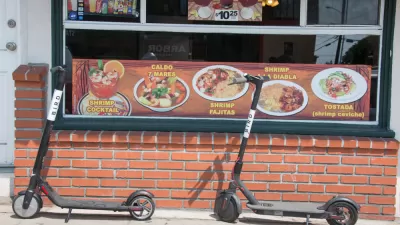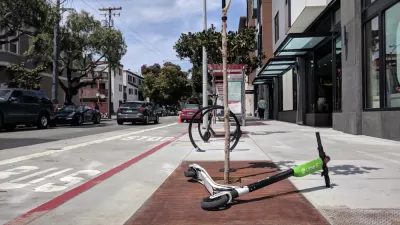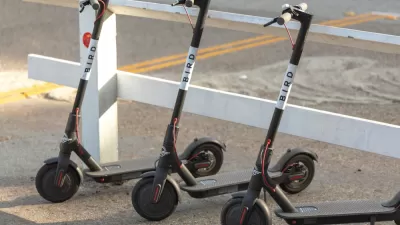Tony Dutzik, senior policy analyst with the Frontier Group, presents three environmental reasons to support shared bikes and scooters, and why cities that have adopted climate plans should accommodate these small, clean, shared vehicles.

"In my home city of Boston, you can now find an increasingly madcap array of small vehicles on the streets and sidewalks – regular bikes, e-bikes, electric scooters, hoverboards, manual and electric skateboards of various kinds," writes Dutzik in a blog post for the Frontier Group. "There are even electric unicycles."
At the same time, app-based shared mobility is making some of these new types of vehicles available to anyone with a couple of bucks and a couple of minutes to download an app. The dockless bikeshare and scooter-share revolution has come quickly – often causing controversy along the way.
All these electric (and human-powered) vehicles and devices "have radical implications for our cities, and for our efforts to curb transportation’s contribution to global warming," he writes. "The environmental case for shared electric vehicles rests on three ideas."
- First, that electric vehicles are vastly more energy efficient than internal combustion engine vehicles and can run on clean energy.
- Second, that sharing vehicles eliminates the inherent incentive to drive that comes with having a vehicle sitting in your driveway that you are already paying for.
- The third – and probably least frequently discussed – idea is that internal combustion engines and individual ownership force a design logic on our vehicles that limits our opportunities to make them more efficient.
In a lengthy April interview with The New York Times in Venice, Los Angeles, where Bird has built its new headquarters, founder and CEO Travis VanderZanden makes the equity case for sharing these vehicles.
“Not everyone can afford their own electric scooter,” he said. “We shouldn’t discriminate against people that are renting versus owning.”
His point is a valid one. In the days since the Birds, as well as the Lime and Spin scooters have disappeared from the streets of San Francisco, one can still spot occasional electric scooters in the bike lanes, but without the names of the scooter-share companies.
Last words go to Dutzik:
A future in which small-scale electric and manually-powered mobility can work its transformative magic is one in which our cities must make a bold commitment to reallocating space on our streets – giving small, slow, light vehicles at least as much priority as big, heavy ones – and renegotiating the rules of how we all get around.
FULL STORY: Scoot Over, Cars: Making Space for Small Vehicles

Study: Maui’s Plan to Convert Vacation Rentals to Long-Term Housing Could Cause Nearly $1 Billion Economic Loss
The plan would reduce visitor accommodation by 25,% resulting in 1,900 jobs lost.

North Texas Transit Leaders Tout Benefits of TOD for Growing Region
At a summit focused on transit-oriented development, policymakers discussed how North Texas’ expanded light rail system can serve as a tool for economic growth.

Why Should We Subsidize Public Transportation?
Many public transit agencies face financial stress due to rising costs, declining fare revenue, and declining subsidies. Transit advocates must provide a strong business case for increasing public transit funding.

How Community Science Connects People, Parks, and Biodiversity
Community science engages people of all backgrounds in documenting local biodiversity, strengthening connections to nature, and contributing to global efforts like the City Nature Challenge to build a more inclusive and resilient future.

Alabama: Trump Terminates Settlements for Black Communities Harmed By Raw Sewage
Trump deemed the landmark civil rights agreement “illegal DEI and environmental justice policy.”

Dear Tesla Driver: “It’s not You, It’s Him.”
Amidst a booming bumper sticker industry, one writer offers solace to those asking, “Does this car make me look fascist?”
Urban Design for Planners 1: Software Tools
This six-course series explores essential urban design concepts using open source software and equips planners with the tools they need to participate fully in the urban design process.
Planning for Universal Design
Learn the tools for implementing Universal Design in planning regulations.
City of Santa Clarita
Ascent Environmental
Institute for Housing and Urban Development Studies (IHS)
City of Grandview
Harvard GSD Executive Education
Toledo-Lucas County Plan Commissions
Salt Lake City
NYU Wagner Graduate School of Public Service





























